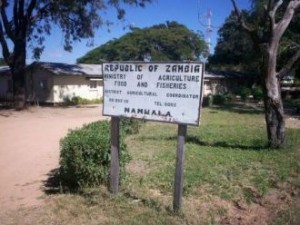Stiffkitten's Blog | 2 November 2010
by Peter Kenworthy
Small scale farming is a vital and widespread means of occupation and income in Zambia, as it is throughout Africa, due to lack of formal employment opportunities in the country. That those small-scale farmers who tend the land, but often do not own it, are consulted on issues relating to their land is subsequently of vital importance to the financial wellbeing of a large proportion of the Zambian population. Unfortunately, land administration policies in Zambia are heavily centralized. The 1995 Lands Act that regulates Zambia’s land policy stipulates that all land is to be held in trust by the president, and most of the poor people live on customary land as they cannot afford to obtain a leasehold tenure.
There are organisations trying to rectify this, however. The Zambia Land Alliance (ZLA), a network of NGOs working for pro-poor land policies, has previously criticised both post-independence and present land legislation as being inadequate, of not listening to the poor that to a large degree tend the land, and of focusing too heavily on liberalizing land markets. According to a ZLA press release from October 21, “large scale land acquisition can mark the beginning of a generation of people without ownership and control of land leading to food insecurity, undesirable economic, political, social and environmental consequences on rural communities”.
Archie Mulanda from the ZLA fears that the Zambian government’s most recent land legislation proposal, a draft Lands Tribunal Bill that he believes will soon be passed into law, is yet another example of legislation that bypasses the poor. “The government has not taken this bill to the public for consultations”, he says of the draft that will give the Lands Tribunal “jurisdiction to bear and determine disputes relating to land and in particular to inquire into, and make awards or decisions in, any dispute relating to land under customary tenure”. Additionally, Archie Mulanda says that that the Zambian government’s policies of liberalizing land markets and focusing on foreign investment are evidently having a direct and detrimental impact on Zambia’s rural poor and gives a recent example of such land grabbing. “About 52 households have been displaced from traditional land in Mpongwe district of the Copperbelt province for large scale foreign investment, where farms have grabbed traditional land where these people lived for over 50 years for cattle launching. The traditional leader has little say on the matter because of the government involvement”.













